illiterate翻译
《全新版大学英语》综合教程5课后翻译

Unit 1 Love of Reading我的祖母不识字,但是她有一箩筐的神话和传奇故事。
小时候我老是缠着她,要她给我讲故事。
而她在忙完家务后,总会把我抱在膝上,一边讲故事一边有节奏地晃动我。
我父亲母亲发现了我对故事的浓重兴趣,不失机机地指引我进行阅读。
他们给我买了很多带插图的故事书,有空的时候就一遍遍地读给我听。
慢慢地我认识了好多字,能自行阅读了。
Although my grandmother was illiterate, she had a good stack of myths and legends . WhenI was young I gave her no peace, constantly asking her to tell mestories.After she had finished her housework, she would lift me onto her lap and tell stories,all the while rocking me in rhythm.Having noticed my interest in stories, my parents lost no time in initiatingme into reading. They bought many storybooks with illustrations, and whenever free, they would read these stories to me over and over again. By and by I had a vocabulary large to read on my own .Unit 2 Diet一项又一项的研究发现,食品和一些慢性病之间有亲密关系。
比如:某些慢性病危险的降低和多吃以食品为基本成分的食品是有关系的。
所以,在过去的十年中,美国饮食协会督促美国人减少动物脂肪的摄入,增添水果、蔬菜和谷物的花费。
郭著章《英汉互译实用教程》(第4版)教材配套题库-第9章 文化与翻译【圣才出品】
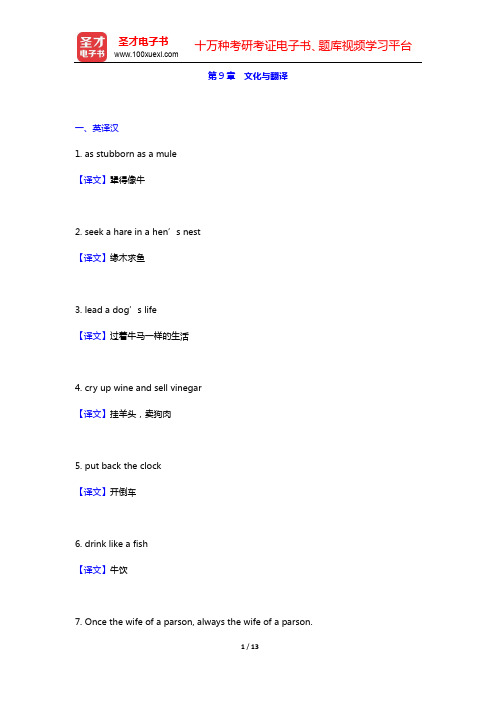
第9章文化与翻译一、英译汉1. as stubborn as a mule【译文】犟得像牛2. seek a hare in a hen’s nest【译文】缘木求鱼3. lead a dog’s life【译文】过着牛马一样的生活4. cry up wine and sell vinegar【译文】挂羊头,卖狗肉5. put back the clock【译文】开倒车6. drink like a fish【译文】牛饮7. Once the wife of a parson, always the wife of a parson.【译文】嫁鸡随鸡,嫁狗随狗。
8. —“Until her husband won the pools, she was the most commonplace, dowdy, illiterate creature imaginable, but now that she dresses herself up like a society queen and nearly always remembers to sound her aitches, people are already beginning to forget what she was like before.”—“Fine feathers make fine birds.”【译文】——“过去没有比她更平平常常、无知无识而又邋邋遢遢的了,自从她男人赢得全部赌注以后,她打扮得象个社交皇后,总是记住发H的音,人们开始忘记她以前是什么样子了。
”——“人靠衣裳马靠鞍嘛。
”9. I’d much rather see her once or twice and not do anything about it---what could I do about it anyway? She’s a bit out of my class, don’t you think? If I did try to do anything, I’d only get sent off with a flea in my ear.【译文】我宁愿见她一两面就算了──我还能干什么呢?你没看到她和我不怎么相称吗?我要干点什么,也只会碰一鼻子灰。
《全新版大学英语》综合教程5课后翻译

Unit 1 Love of Reading我的祖母不识字,可是她有一箩筐的神话和传奇故事。
小时候我总是缠着她,要她给我讲故事。
而她在忙完家务后,总会把我抱在膝上,一边讲故事一边有节奏地晃动我。
我父母发现了我对故事的浓厚兴趣,不失时机地引导我进行阅读。
他们给我买了许多带插图的故事书,有空的时候就一遍遍地读给我听。
慢慢地我认识了很多字,能自行阅读了。
Although my grandmother was illiterate, she had a good stack of myths and legends. When I was young I gave her no peace, constantly asking her to tell me stories. After she had finished her housework, she would lift me onto her lap and tell stories, all the while rocking me in rhythm.Having noticed my interest in stories, my parents lost no time in initiating me into reading. They bought many storybooks with illustrations, and whenever free, they would read these stories to me over and over again. By and by I had a vocabulary large to read on my own .Unit 2 Diet一项又一项的研究发现,食物和一些慢性病之间有密切关系。
例如:某些慢性病危险的降低和多吃以食物为基本成分的食物是相关联的。
因此,在过去的十年中,美国饮食协会敦促美国人减少动物脂肪的摄取,增加水果、蔬菜和谷物的消费。
Unit 1 Love of reading全新版大学英语综合教程五课文翻译
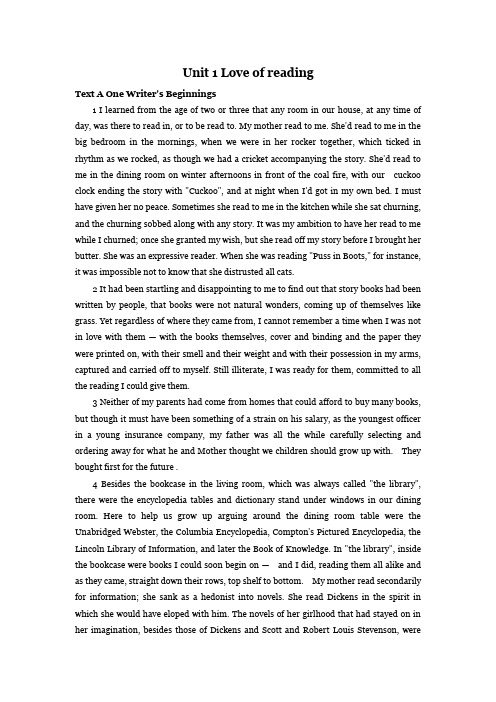
Unit 1 Love of readingText A One Writer's Beginnings1 I learned from the age of two or three that any room in our house, at any time of day, was there to read in, or to be read to. My mother read to me. She'd read to me in the big bedroom in the mornings, when we were in her rocker together, which ticked in rhythm as we rocked, as though we had a cricket accompanying the story. She'd read to me in the dining room on winter afternoons in front of the coal fire, with our cuckoo clock ending the story with "Cuckoo", and at night when I'd got in my own bed. I must have given her no peace. Sometimes she read to me in the kitchen while she sat churning, and the churning sobbed along with any story. It was my ambition to have her read to me while I churned; once she granted my wish, but she read off my story before I brought her butter. She was an expressive reader. When she was reading "Puss in Boots," for instance, it was impossible not to know that she distrusted all cats.2 It had been startling and disappointing to me to find out that story books had been written by people, that books were not natural wonders, coming up of themselves like grass. Yet regardless of where they came from, I cannot remember a time when I was not in love with them —with the books themselves, cover and binding and the paper they were printed on, with their smell and their weight and with their possession in my arms, captured and carried off to myself. Still illiterate, I was ready for them, committed to all the reading I could give them.3 Neither of my parents had come from homes that could afford to buy many books, but though it must have been something of a strain on his salary, as the youngest officer in a young insurance company, my father was all the while carefully selecting and ordering away for what he and Mother thought we children should grow up with. They bought first for the future .4 Besides the bookcase in the living room, which was always called "the library", there were the encyclopedia tables and dictionary stand under windows in our dining room. Here to help us grow up arguing around the dining room table were the Unabridged Webster, the Columbia Encyclopedia, Compton's Pictured Encyclopedia, the Lincoln Library of Information, and later the Book of Knowledge. In "the library", inside the bookcase were books I could soon begin on —and I did, reading them all alike and as they came, straight down their rows, top shelf to bottom. My mother read secondarily for information; she sank as a hedonist into novels. She read Dickens in the spirit in which she would have eloped with him. The novels of her girlhood that had stayed on in her imagination, besides those of Dickens and Scott and Robert Louis Stevenson, wereJane Eyre, Trilby, The Woman in White, Green Mansions, King Solomon's Mines.5 To both my parents I owe my early acquaintance with a beloved Mark Twain. There was a full set of Mark Twain and a short set of Ring Lardner in our bookcase, and those were the volumes that in time united us all, parents and children.6 Reading everything that stood before me was how I came upon a worn old book that had belonged to my father as a child. It was called Sanford and Merton. Is there anyone left who recognizes it, I wonder? It is the famous moral tale written by Thomas Day in the 1780s, but of him no mention is made on the title page of this book; here it is Sanford and Merton in Words of One Syllable by Mary Godolphin. Here are the rich boy and the poor boy and Mr. Barlow, their teacher and interlocutor, in long discourses alternating with dramatic scenes —anger and rescue allotted to the rich and the poor respectively. It ends with not one but two morals, both engraved on rings: "Do what you ought, come what may," and "If we would be great, we must first learn to be good."7 This book was lacking its front cover, the back held on by strips of pasted paper, now turned golden, in several layers, and the pages stained, flecked, and tattered around the edges; its garish illustrations had come unattached but were preserved, laid in. I had the feeling even in my heedless childhood that this was the only book my father as a little boy had had of his own. He had held onto it, and might have gone to sleep on its coverless face: he had lost his mother when he was seven. My father had never made any mention to his own children of the book, but he had brought it along with him from Ohio to our house and shelved it in our bookcase.8 My mother had brought from West Virginia that set of Dickens: those books looked sad, too — they had been through fire and water before I was born, she told me, and there they were, lined up — as I later realized, waiting for me.9 I was presented, from as early as I can remember, with books of my own, which appeared on my birthday and Christmas morning. Indeed, my parents could not give me books enough. They must have sacrificed to give me on my sixth or seventh birthday — it was after I became a reader for myself-the ten-volume set of Our Wonder World. These were beautifully made, heavy books I would lie down with on the floor in front of the dining room hearth, and more often than the rest volume 5, Every Child's Story Book, was under my eyes. There were the fairy tales —Grimm, Andersen, the English, the French, "Ali Baba and the Forty Thieves"; and there was Aesop and Reynard the Fox; there were the myths and legends, Robin Hood, King Arthur, and St. George and the Dragon, even the history of Joan of Arc; a whack of Pilgrim's Progress and a long piece of Gulliver. They all carried their classic illustrations. I located myself in these pages andcould go straight to the stories and pictures I loved; very often "The Yellow Dwarf" was first choice, with Walter Crane's Yellow Dwarf in full color making his terrifying appearance flanked by turkeys. Now that volume is as worn and backless and hanging apart as my father's poor Sanford and Merton. One measure of my love for Our Wonder World was that for a long time I wondered if I would go through fire and water for it as my mother had done for Charles Dickens; and the only comfort was to think I could ask my mother to do it for me.10 I believe I'm the only child I know of who grew up with this treasure in the house.I used to ask others, "Did you have Our Wonder World?" I'd have to tell them The Book of Knowledge could not hold a candle to it.11 I live in gratitude to my parents for initiating me —as early as I begged for it, without keeping me waiting — into knowledge of the word, into reading and spelling, by way of the alphabet. They taught it to me at home in time for me to begin to read before starting to school.12 Ever since I was first read to, then started reading to myself, there has never beena line read that I didn't hear. As my eyes followed the sentence, a voice was saying it silently to me. It isn't my mother's voice, or the voice of any person I can identify, certainly not my own. It is human, but inward, and it is inwardly that I listen to it. It is to me the voice of the story or the poem itself. The cadence, whatever it is that asks you to believe, the feeling that resides in the printed word, reaches me through the reader-voice: I have supposed, but never found out, that this is the case with all readers — to read as listeners — and with all writers, to write as listeners. It may be part of the desire to write. The sound of what falls on the page begins the process of testing it for truth , for me. Whether I am right to trust so far I don't know. By now I don't know whether I could do either one, reading or writing, without the other.13 My own words, when I am at work on a story, I hear too as they go, in the same voice that I hear when I read in books. When I write and the sound of it comes back to my ears, then I act to make my changes. I have always trusted this voice.作家起步时我从两三岁起就知道,家中随便在哪个房间里,白天无论在什么时间,都可以念书或听人念书。
大学英语综合教程5课文翻译
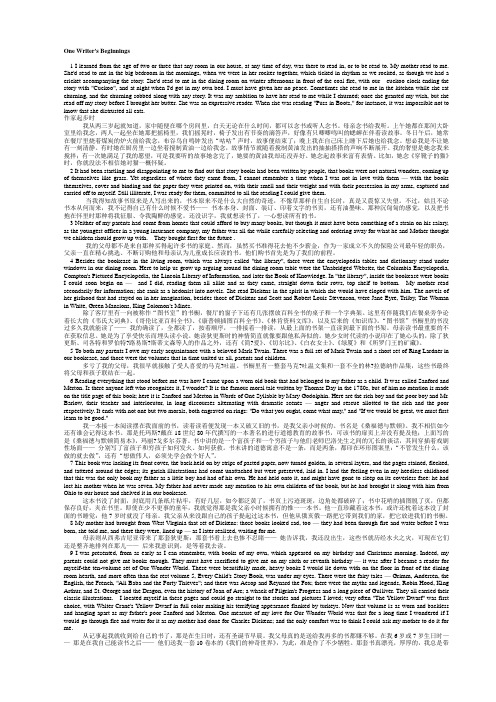
One Writer's Beginnings1 I learned from the age of two or three that any room in our house, at any time of day, was there to read in, or to be read to. My mother read to me. She'd read to me in the big bedroom in the mornings, when we were in her rocker together, which ticked in rhythm as we rocked, as though we had a cricket accompanying the story. She'd read to me in the dining room on winter afternoons in front of the coal fire, with our cuckoo clock ending the story with "Cuckoo", and at night when I'd got in my own bed. I must have given her no peace. Sometimes she read to me in the kitchen while she sat churning, and the churning sobbed along with any story. It was my ambition to have her read to me while I churned; once she granted my wish, but she read off my story before I brought her butter. She was an expressive reader. When she was reading "Puss in Boots," for instance, it was impossible not to know that she distrusted all cats.作家起步时我从两三岁起就知道,家中随便在哪个房间里,白天无论在什么时间,都可以念书或听人念书。
河海大学研究生英语课文翻译11、12、13、14、16、17、18、19、20
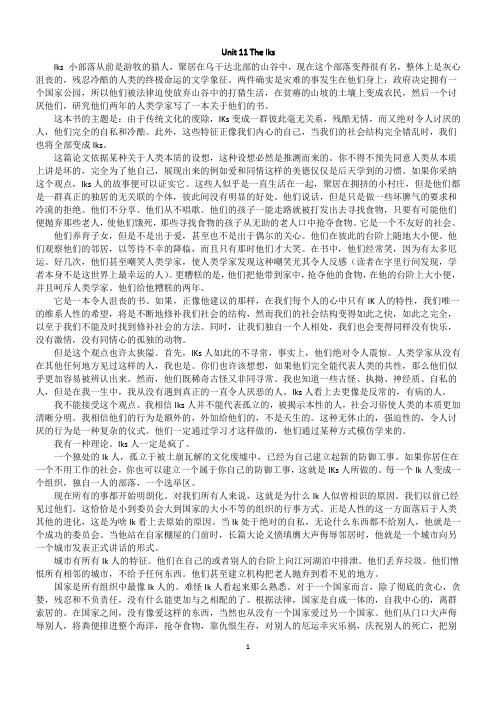
Unit 11 The IksIks 小部落从前是游牧的猎人,聚居在乌干达北部的山谷中,现在这个部落变得很有名,整体上是灰心沮丧的,残忍冷酷的人类的终极命运的文学象征。
两件确实是灾难的事发生在他们身上:政府决定拥有一个国家公园,所以他们被法律迫使放弃山谷中的打猎生活,在贫瘠的山坡的土壤上变成农民,然后一个讨厌他们,研究他们两年的人类学家写了一本关于他们的书。
这本书的主题是:由于传统文化的废除,IKs变成一群彼此毫无关系,残酷无情,而又绝对令人讨厌的人,他们完全的自私和冷酷。
此外,这些特征正像我们内心的自己,当我们的社会结构完全错乱时,我们也将全部变成Iks。
这篇论文依据某种关于人类本质的设想,这种设想必然是推测而来的。
你不得不预先同意人类从本质上讲是坏的,完全为了他自己,展现出来的例如爱和同情这样的美德仅仅是后天学到的习惯。
如果你采纳这个观点,Iks人的故事便可以证实它。
这些人似乎是一直生活在一起,聚居在拥挤的小村庄,但是他们都是一群真正的独居的无关联的个体,彼此间没有明显的好处。
他们说话,但是只是做一些坏脾气的要求和冷漠的拒绝。
他们不分享。
他们从不唱歌。
他们的孩子一能走路就被打发出去寻找食物,只要有可能他们便抛弃那些老人,使他们饿死,那些寻找食物的孩子从无助的老人口中抢夺食物。
它是一个不友好的社会。
他们养育子女,但是不是出于爱,甚至也不是出于偶尔的关心。
他们在彼此的台阶上随地大小便。
他们观察他们的邻居,以等待不幸的降临,而且只有那时他们才大笑。
在书中,他们经常笑,因为有太多厄运。
好几次,他们甚至嘲笑人类学家,使人类学家发现这种嘲笑尤其令人反感(读者在字里行间发现,学者本身不是这世界上最幸运的人)。
更糟糕的是,他们把他带到家中,抢夺他的食物,在他的台阶上大小便,并且呵斥人类学家。
他们给他糟糕的两年。
它是一本令人沮丧的书。
如果,正像他建议的那样,在我们每个人的心中只有IK人的特性,我们唯一的维系人性的希望,将是不断地修补我们社会的结构,然而我们的社会结构变得如此之快,如此之完全,以至于我们不能及时找到修补社会的方法。
葛浩文的汉英翻译方法探究——以莫言在诺贝尔文学奖颁奖典礼上的演讲辞英译为例

葛浩文的汉英翻译方法探究——以莫言在诺贝尔文学奖颁奖典礼上的演讲辞英译为例刘梅芳【期刊名称】《《英语教师》》【年(卷),期】2019(019)018【总页数】4页(P39-42)【关键词】葛浩文; 莫言; 诺贝尔文学奖; 演讲辞; 汉英翻译方法【作者】刘梅芳【作者单位】215000 江苏苏州苏州大学文正学院外语系【正文语种】中文引言葛浩文是美国当代著名的翻译家、汉学家,也是当今英语世界最耀眼的中国文学翻译家。
其翻译既严谨又不失灵活,让中国文学呈现了一定的文学色彩。
在四十余年的翻译历程中,葛浩文翻译了大量现当代中国作家的文学作品,为促进中国文学文化在海外的传播、扩大中国文学文化在国际舞台上的影响作出了巨大贡献。
四十余年来,葛浩文一直笔耕不辍,不断将现当代中国作家的优秀文学作品介绍给世界。
就体裁而言,葛浩文翻译的作品涉及面十分广泛,既有小说,又有诗歌和回忆录,将莫言、苏童、王朔、萧红、毕飞宇、冯骥才、贾平凹、朱天文、姜戎、朱天心等数十位中国现当代最著名作家及其作品推上了国际舞台(贾燕芹2012:62;孙会军2011:1)。
他所翻译的台湾作家朱天文的《荒人手记》(Notes of a Decadent Man)于1999 年获得了美国翻译家协会颁发的“年度最佳译作奖”,贾平凹的《浮躁》(Turbulence)获得了“美孚飞马文学奖”(Mobil Pegasus Prize for Literature),莫言的《生死疲劳》(Life and Death Are Wearing Me Out)获得“纽曼华语文学奖”,姜戎的《狼图腾》(Wolf Totem)获2007年“曼氏亚洲文学奖”,苏童的《河岸》(The Redemption Boat)获“2009 年曼氏亚洲文学奖”。
2008 年,葛浩文所翻译的毕飞宇的作品《青衣》(Moon Opera)成功入围英国《独立报》(The Independent)外国小说奖复评名单。
翻译技巧之转化法
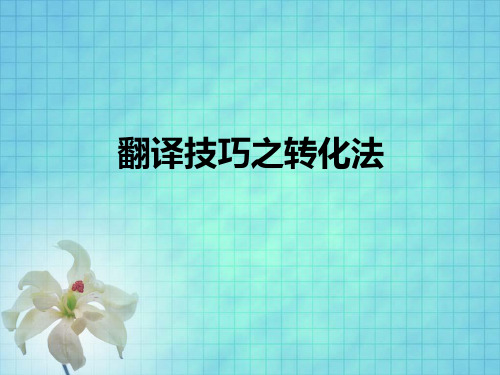
三、 转译成形容词
1.名词变形容词 • He found some difficulties to design a reactor without a computer.
• 她感到没有电脑要设计反应堆是困难 的。 • They admitted the feasibility of our proposal. • 他们承认我们的建议是可行的。
或者带有否定意义的词缀dedisimunlessopportunemomentdivertattentionfrom失败没做成抓住机会不失时机欺骗性的靠不住的发牢骚不满意反对对着不符合自然规律正如所期望的那样不出所料空前的史无前例的分散注意力不考虑在价格之上无价的在10英里之内不到10英losetimeindecisive不安全的危险的不喜欢厌恶情绪没有留下怀疑清清楚楚地不失去时间赶快不识字的人文盲不完全的残缺的不能阅读的人睁眼瞎不经常的偶尔的没面子的丢面子不同寻常的异乎寻常的不能决定的优柔寡断的立场语气的需要一表达习惯的需要invitationonlykeepupright
Ex:
1. Undoubtedly they don’t have the intention of making an engineer of him, and I suspect they never will. 2. The application of electronic computers makes for a tremendous rise in labor productivity. 3. The engine has given a constantly good performance. 4. Professor Wilson is said to be a lady killer. 5. The well known scientist was a great lover of literature when he was a child. 6. Differences between the social systems of states shall not be an obstacle to their contact and cooperation.
- 1、下载文档前请自行甄别文档内容的完整性,平台不提供额外的编辑、内容补充、找答案等附加服务。
- 2、"仅部分预览"的文档,不可在线预览部分如存在完整性等问题,可反馈申请退款(可完整预览的文档不适用该条件!)。
- 3、如文档侵犯您的权益,请联系客服反馈,我们会尽快为您处理(人工客服工作时间:9:00-18:30)。
"illiterate" 在中文中可以翻译为"文盲"、"不识字的" 或"无文化的"。
这个词形容一个人缺乏基本的读写能力或教育背景。
"illiterate" 还可以用作名词,指代一个文盲或不识字的人。
以下是一些示例句子:
She is illiterate and cannot read or write.(她是个文盲,不识字也不会写字。
)
Illiteracy is a significant issue in many developing countries.(文盲问题在许多发展中国家是一个重要的问题。
)
The government is working to reduce illiteracy rates through educational programs.(政府正在通过教育计划来降低文盲率。
)
He grew up in a rural village where illiteracy was common.(他在一个文盲普遍的农村村庄长大。
)。
